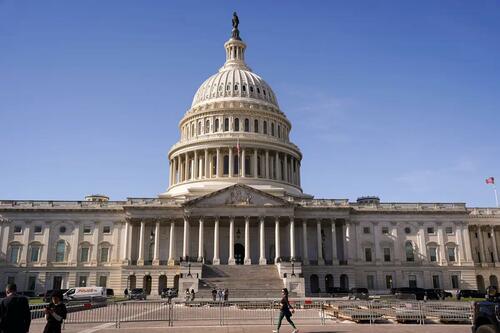Authored by Andre Thornebrooke via The Epoch Times (emphasis ours)

The United States must expand and modernize its nuclear arsenal beyond planned improvements to deter combined aggression from communist China and Russia, according to a new congressional report.
Planned nuclear capacity “limits” the United States' ability to effectively prevent a war with China and Russia, says the report (pdf) by the Congressional Commission on the Strategic Posture of the United States.
“Given current threat trajectories, our nation will soon encounter a fundamentally different global setting than it has ever experienced: we will face a world where two nations possess nuclear arsenals on par with our own,” the report says.
“The size and composition of the nuclear force must account for the possibility of combined aggression from Russia and China.”
The report emphasizes that a new conflict with either or both of the powers could realistically result in nuclear catastrophe and would need to be deterred.
“There is a growing risk of confrontation with China, Russia, or both. This includes the risk of military conflict,” the report says.
“Unlike World Wars I and II, a major power conflict in the 21st century has the potential to escalate into a large-scale nuclear war.”
In all, the report says that current plans for modernization of the nation’s nuclear forces are “necessary, but not sufficient,” given the increasing capability of China and Russia to jointly threaten the United States with their nuclear arsenals.
“Deployed strategic nuclear force requirements will increase for the United States in such a threat environment,” the report says.
Hudson Institute senior fellow Marshall Billingslea, who co-authored the report, said a key factor in the commission’s decision-making was the Chinese Communist Party’s (CCP) rapid expansion of its nuclear arsenal.
“They’re on pace to either rival or perhaps surpass the number of fielded nuclear weapons that we ourselves possess,” Mr. Billingslea said during a Nov. 30 talk at the Heritage Foundation, a conservative think tank.
“Let’s be clear, when you have a China that has gone from, let’s say, around 250 nuclear weapons to … around 700 by 2027 … that’s a fundamental game changer.”
Mr. Billingslea’s comments referred to the Pentagon’s most recent China Military Power Report, which found that the regime likely already has 500 deployed nuclear warheads and will have more than 1,000 by 2030.
Moreover, because of China’s size and economic power, he said the nation cannot rely on coercive economic methods to bring China to the nonproliferation table.
“When you’re talking about China, which has an economy nearly as large as ours … some of the tools that we traditionally have relied upon to deal with the Russias and the Irans and the Venezuelas and the North Koreas, are simply not available in a Chinese context.”
As such, he said the commission recommended the United States increase the number of its “shorter and medium-range” missiles and invest in “hypersonics” to deploy both nuclear and conventional weapons.
“The sheer increase in the number of targets implied by this Chinese buildup … [suggests] that the program of record that was foreseen back in 2010 is not sufficient,” he said.
Similarly, Hudson Institute senior fellow Rebeccah Heinrichs, also a co-author of the report, said the new posture was necessary to counter a united China and Russia, which have entered an unprecedented comprehensive strategic partnership.
“What the report finds is that the United States must be able to deter both Russia and China simultaneously,” Ms. Heinrichs said.
“That’s obviously going to change the United States’ strategic posture.”
Selling the idea of supplemental spending for nuclear weapons may not be an easy task. Concerns about war profiteering are growing amid unprecedented defense spending by the Biden administration.
Additionally, the Hudson Institute’s close financial relationship with key defense corporations may diminish its credibility with some in Congress. According to the organization’s financials (pdf), defense contractors gave the think tank more than half a million dollars last year.